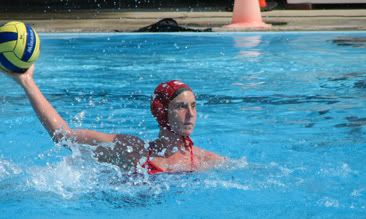
When I walk into the practice facility of the U.S. Women’s Olympic Water Polo team, there are only a handful of people in the stands, and almost all of them are there to watch the Los Alamitos junior swimming club that’s using the other half of the pool. For the last half hour, I’m alone—save one broadcaster from NPR—in watching these Olympians tune up their game for Beijing. In a few weeks, they’ll walk in the opening ceremony, before an audience approximately one billion times larger than just me, and a few days later they’ll begin competing for gold on an international stage. The magnitude of that difference definitely seems to affect me more than it does them.
I got a chance to talk to Lauren Wenger for a few minutes after, and she managed to calm me down a little. If you’re not familiar with Wenger…well, you’re not as bright as I thought you were, but I’ll forgive you. Wenger—who is ten days younger than me, a fact that definitely makes me feel like I’ve wasted my life—graduated from Wilson in 2002, where she was an All-American, a four-time scholar-athlete award recipient, and trained with the junior national team. Then she went on to USC, where she won the Peter Cutino Award her senior year in 2006 (water polo’s Heisman), led the Trojans to a runner-up finish in the national championship, scored 127 career goals from her position as a defensive player, and a half-dozen other sundry awards. Wenger has also been an integral part of a national team that has won five major international tournaments in the last two years, and is heading into the Olympics the number one-ranked team in the world.
Which perhaps explains why she’s more equipped than I to deal with the fact that a fellow member of the 2002 Long Beach high school graduating class might be a month away from a gold medal. “It’s the Olympics,” I started the interview. “Are you freaking out?” Her response: “It’s unbelievable that we’re going to the Olympics, but I’ve been trying to keep the mindset that it’s just another international tournament.” Fair enough.
“Is it extra pressure going into the Olympics ranked number one in the world?”
“There is extra pressure, but like I said it’s just another tournament—we just want to be in the medal round, that’s our approach to every tournament.” Gotcha.

Then I asked her if they were looking forward to seeing the Great Wall, or any other sightseeing, and she told me that they did all the major cultural stuff when they were over there earlier in the month. “When we get there, it’ll be all business,” she said. “We’ll be on our regular schedule, we’ll do some lifting, some swimming. Nothing changes.”
The “we” Wenger refers to includes a staggering number of current Long Beach residents—8 members of the team and staff live in the city, head coach Guy Baker is a Long Beach State legend, and teammate Erika Figge’s younger sister Brooke still plays water polo for the 49ers. “It’s different having everyone here,” she said. “I’ve never had that before. It’s cool to see everyone come to my town and have them experience what I experience. When we have free time, we go eat on 2nd Street or in Seal.”
Wenger is a highly experienced athlete on the international level, so it wasn’t surprising for me to hear the “just another tournament” mentality—after all, it wouldn’t be to her benefit to psych herself out before her first Olympic games.
Still, when I asked if she’d be walking in the opening ceremonies, she got a little—just a little—giddy. “Yeah, it’s exciting!” she said. “I think that’s when you get your nervousness, and even more excitement. I don’t know—that’s probably when it’ll hit me.” Lauren Wenger, on behalf of your hometown, I hereby give you free license to be as nervous and giddy and excited as you want—certainly we’ll all be feeling those emothat way for you, as women we may have passed on 2nd Street last weekend compete with the world’s best. Besides, butterflies in the stomach are to be expected—it’s the freaking Olympics!
